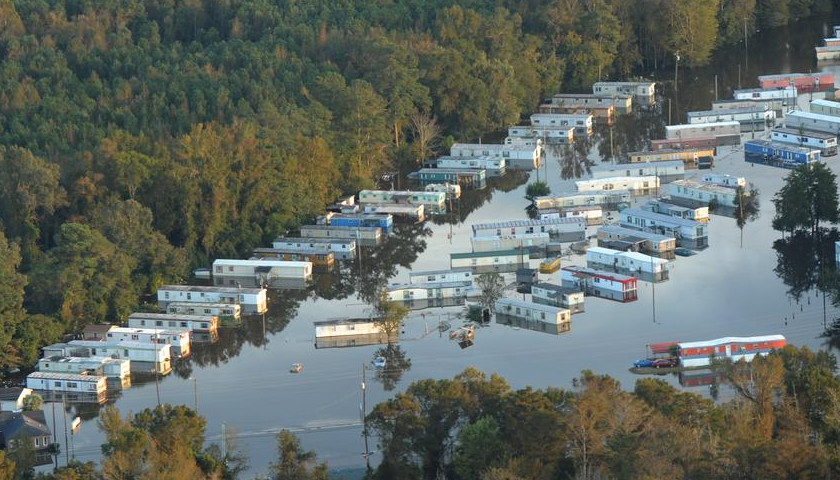North Carolina’s ongoing hurricane relief and recovery efforts are being hindered by an apparent contract issue involving the North Carolina Emergency Management System and a company contracted to do the work.
WBTV reported:
A seven-figure contract to help repair homes damaged by Hurricane Florence was cancelled in late December, a little more than a month after it was awarded, due to errors in the procurement process.
North Carolina Emergency Management awarded a contract to AECOM to administer a program funded by the US Federal Emergency Management Agency called the Sheltering and Temporary Essential Power Program.
North Carolina Emergency Management (NCEM) denied that any work stopped.
“It’s not accurate to say that work has stopped or been delayed on the STEP program, or that it’s unknown when it will resume.” NCEM spokesman Keith Acree told WBTV. “Home repair work in the program continues without interruption and AECOM continues to manage the STEP.”
NCEM’s claim that work did not stop appears to be false according to a December 27, 2018 email obtained by WBTV:
Per our phone conversation on 12/27/2018, the Department of Administration has directed the Department of Public Safety, Division of Emergency Management (NCEM) to inform you that due to the upholding of the protests from IEM and Community Recovery Alliance, AECOM must cease working as the program manager for 19-RFP-014458-WAX. As part of this stop work order AECOM and NCEM will develop and submit a transition plan that will enable to NCEM and AECOM to perform some services that will not adversely impact program participants until a handover can be fully completed. AECOM will finalize and submit any invoices for services rendered to NCEM.
The day after WBTV aired their initial report on the stop work order, Governor Cooper blamed the government shut down for disaster relief delays tied to hurricane Florence.
“The people of North Carolina are strong and are working hard to rebuild. But we are equally determined to hold the federal government to its promise of help,” Gov. Cooper wrote in a letter to President Trump. ” During your visit following Hurricane Florence, you promised me the 100% support of the federal government in North Carolina’s recovery. This shutdown makes that promise harder to keep. Please work with Congressional leaders to end this shutdown so our communities can rebuild quickly and effectively.”
This is not the first time NCEM has come under fire regarding hurricane relief contracts. North Carolina was also hit by Hurricane Matthew in 2016.
In 2017, it was discovered that no recovery projects had been completed in the two years since Hurricane Matthew hit North Carolina. NCEM and Governor Cooper’s office made headlines last year when the bid process for the contract related to Hurricane Matthew relief was questioned.
Over the course of the hurricane Matthew relief process, Governor Cooper’s office and NCEM failed to meet two self-imposed deadlines and the required environmental impact study was rejected by HUD.
Multiple companies were in the bidding process for the contract to manage North Carolina’s Federal Community Development Block Grant – Disaster Recovery (CBDG-DR) program grant.
The Request for Proposal (RFP) process for Hurricane Matthew relief began in December of 2016, however records show the RFP process was repeated three times until a final RFP was issued in June of 2018.
The selection committee seemingly changed their mind from awarding parts the contract to different companies. Instead, the final $15.5 million dollar contract went to a single company called Innovative Emergency Management (IEM).
It was revealed in 2017 that IEM had a checkered track record in other states in managing disaster relief projects. In Louisiana alone 443 deficiency letters and notifications of performance penalties were filed against IEM.
During the bidding process for the project in Louisiana, a protest was filed by AECOM. In contrast, the AECOM contract recently reported on by WBTV was protested by IEM.
Despite the questionable bid process and IEM’s performance record issues, both NCEM officials and Governor Cooper maintain that nothing is wrong with the RFP or selection process.
It may also be noteworthy that IEM has a history of winning contracts in states where its president has made significant political donations.
IEM’s President Madhu Beriwal donated to Governor Roy Cooper’s campaign in 2016. Beriwal gave Cooper $5,100, which is the maximum donation amount.
North Carolina Congressman David Price, who sits on the appropriations committee that handles FEMA contracts, also received $10,700 in donations from Beriwal between 2014 to 2016.
In the year prior to Beriwal’s first campaign donation to Price, the congressman announced a $6.9 million dollar contract between IEM and the Department of Homeland Security.
In 2015, Louisiana Governor John Bel Edwards’ campaign also received $5,000 from Beriwal. Two years after Edwards was elected governor, IEM was granted a large contract in Louisiana.
– – –
A.P. Dillion is a reporter at Battleground State News.
Photo “North Carolina Hurricane Damage” by Jocelyn Augustino.





